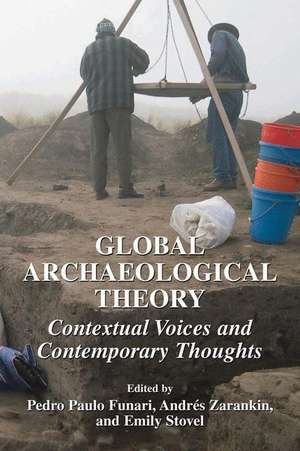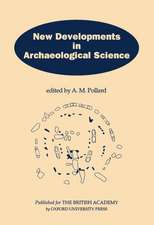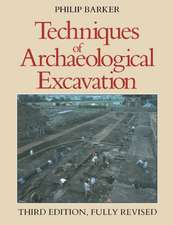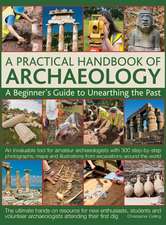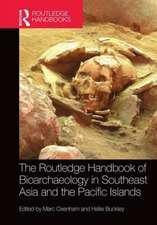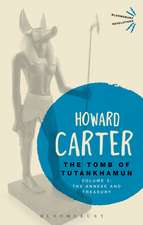Global Archaeological Theory: Contextual Voices and Contemporary Thoughts
Editat de Pedro Paulo Funari, Andrés Zarankin, Emily Stovelen Limba Engleză Paperback – 10 ian 2005
Post-processual theory also incorporates a conscious and explicit political interest on the past of the scholar and the subject. This includes fields and topics such as gender issues, ethnicity, class, landscapes, and consumption. This reflects a conscious attempt to also decentralize the discipline, from an imperialist point of view to an empowering one. Method and theory also means being politically aware and engaged to incorporate diverse critical approaches to improve understanding of the past and the present.
This book focuses on the fundamental theoretical issues found in the discipline and thus both engages and represents the very rich plurality of the post-processual approach to archaeology. The book is divided into four sections: Issues in Archaeological Theory, Archaeological Theory and Method in Action, Space and Power in Material Culture, and Images as Material Discourse.
| Toate formatele și edițiile | Preț | Express |
|---|---|---|
| Paperback (1) | 957.62 lei 6-8 săpt. | |
| Springer Us – 10 ian 2005 | 957.62 lei 6-8 săpt. | |
| Hardback (1) | 965.52 lei 6-8 săpt. | |
| Springer Us – 13 ian 2005 | 965.52 lei 6-8 săpt. |
Preț: 957.62 lei
Preț vechi: 1167.83 lei
-18% Nou
Puncte Express: 1436
Preț estimativ în valută:
183.27€ • 190.62$ • 151.29£
183.27€ • 190.62$ • 151.29£
Carte tipărită la comandă
Livrare economică 15-29 aprilie
Preluare comenzi: 021 569.72.76
Specificații
ISBN-13: 9780306486517
ISBN-10: 0306486512
Pagini: 380
Ilustrații: VIII, 380 p.
Dimensiuni: 178 x 254 x 25 mm
Greutate: 0.79 kg
Ediția:2005
Editura: Springer Us
Colecția Springer
Locul publicării:New York, NY, United States
ISBN-10: 0306486512
Pagini: 380
Ilustrații: VIII, 380 p.
Dimensiuni: 178 x 254 x 25 mm
Greutate: 0.79 kg
Ediția:2005
Editura: Springer Us
Colecția Springer
Locul publicării:New York, NY, United States
Public țintă
ResearchDescriere
Archaeological theory has gone through a great upheaval in the last 50 years – from the processual theory, which wanted to make archaeology more "scientific" to post-processual theory, which understands that interpreting human behavior (even of past cultures) is a subjective study. This subjective approach incorporates a plurality of readings, thereby implying that different interpretations are always possible, allowing us to modify and change our ideas under the light of new information and/or interpretive frameworks. In this way, interpretations form a continuous flow of transformation and change, and thus archaeologists do not uncover a real past but rather construct a historical past or a narrative of the past.
Post-processual theory also incorporates a conscious and explicit political interest on the past of the scholar and the subject. This includes fields and topics such as gender issues, ethnicity, class, landscapes, and consumption. This reflects a conscious attempt to also decentralize the discipline, from an imperialist point of view to an empowering one. Method and theory also means being politically aware and engaged to incorporate diverse critical approaches to improve understanding of the past and the present.
This book focuses on the fundamental theoretical issues found in the discipline and thus both engages and represents the very rich plurality of the post-processual approach to archaeology. The book is divided into four sections: Issues in Archaeological Theory, Archaeological Theory and Method in Action, Space and Power in Material Culture, and Images as Material Discourse.
Post-processual theory also incorporates a conscious and explicit political interest on the past of the scholar and the subject. This includes fields and topics such as gender issues, ethnicity, class, landscapes, and consumption. This reflects a conscious attempt to also decentralize the discipline, from an imperialist point of view to an empowering one. Method and theory also means being politically aware and engaged to incorporate diverse critical approaches to improve understanding of the past and the present.
This book focuses on the fundamental theoretical issues found in the discipline and thus both engages and represents the very rich plurality of the post-processual approach to archaeology. The book is divided into four sections: Issues in Archaeological Theory, Archaeological Theory and Method in Action, Space and Power in Material Culture, and Images as Material Discourse.
Cuprins
Materiality and the Social.- Meanings of Material Culture.- Heideggerian Thoughts.- Tension between Written Document/Material Document?- New Archaeology in Argentina.- Network Theory and Archaeology of Modern History.- The Comparative Method and Study of Spanish and Portuguese South American Material Culture.- Beyond the Sex/Gender Split.- Children’s Activity in the Record of Hunter-Gatherers.- Identity: Ceramic Evidence from Northern Chile.- Stereotypes and Research About Je Populations in South Brazil.- Traveling Objects and Spatial Images.- Materiality of Inka Domination.- Domestication.- Enlightened Discourses.- Social Practices in Spanish Settlement of Floridablanca, Patagonia.- Images as a Material Discourse.- Image of Hestia’s Iconography.- Stylistic Units in Prehistoric Art Research.- Analysis of Rural Scenes in Black and Red-figure Attic Vases and Construction of the Athenian Empire.- The Construction of Archaeological Discourse.- Brazilian Archaeology and Indigenous Identity in Early Decades of the Twentieth Century.- Anglo-American and Latin American Radical Archaeologies.- Archaeology, Ethnography and Romanticism in Imperial Brazil (1838-1867).
Caracteristici
Reflects the fundamental theoretical issues found in the discipline today and thereby has a very rich plurality of archaeology postprocessualism
Includes contributions from scholars throughout Europe, North America, and South America, allowing the reader an interesting opportunity to see a strong international range of theoretical concerns
Includes contributions from scholars throughout Europe, North America, and South America, allowing the reader an interesting opportunity to see a strong international range of theoretical concerns
